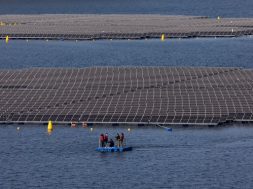
SPI, GIZ Tie Up with MNRE to Elucidate Role of Decentralised Renewable Energy – EQ Mag Pro
An arm of Rockfeller Foundation, Smart Power India (SPI), and GIZ joined hands with the Ministry of New and Renewable Energy (MNRE) to elucidate the role of decentralised renewable energy for the overall development of the nation, according to a statement.
New Delhi : An arm of Rockfeller Foundation, Smart Power India (SPI), and GIZ joined hands with the Ministry of New and Renewable Energy (MNRE) to elucidate the role of decentralised renewable energy for the overall
development of the nation, according to a statement.
“In a bid to encourage decentralised renewable energy (DRE) for the country to be Atmanirbhar, Smart Power India (SPI), a subsidiary of the Rockefeller Foundation and Deutsche Gesellschaft für Internationale Zusammenarbeit
(GIZ) joined hands with the Ministry of New and Renewable Energy, Government of India, to elucidate the role of DRE for the overall development of the nation,” the statement sai.
This partnership came as part of the Azadi ka Amrit Mahotsav, which was celebrated on Thursday. The Mahotsav saw various departments and ministries hosting a set of activities for a resurgent Atmanirbhar Bharat.
It is projected that in 2050, about half of India’s population will still be living in rural areas. India’s economic development is tied to improving rural per-capita incomes.
Hence, it said the story of India’s economic development is incomplete without improved per-capita income in rural areas. This means a continued opportunity for decentralised renewable energy (DRE) and energy efficiency (EE) innovations.
The Indian government’s electrification plans, which predominantly focus on household electrification, have been complemented in two ways.
Firstly, product innovations for livelihood applications, which can use electricity efficiently and effectively. Secondly,
DRE-powered innovations that can bridge gaps in the centralised electricity supply system and which can power incomegenerating activities in rural areas.
At a webinar, Shobhit Srivastava, a scientist at MNRE, said that in the past few years, constant interventions by the ministry and its partners have helped various stakeholders develop schemes for mini-grids and other projects.
This has had an impact on residential and commercial avenues, particularly for areas that are difficult to access such as the northeastern region and economically backward sections of Orissa, he added.
He said community-level intervention has become important at the rural level to ensure clean energy systems. Nidhi Sarin, programme head at GIZ, said the combined efforts of all stakeholders have ensured that Indian villages are no longer in the dark.
She added that GIZ has been fortunate to be a part of this process, working in collaboration to make access to electricity a reality in the country.
She said the emphasis now needs to be on achieving India’s sustainable energy targets along with equitable access to electricity for all.
However, to achieve this, a significant increase in annual investments will be required. The increment in the level of investment will only be possible by including significant changes to India’s existing DRE policy framework.
Samit Mitra, senior director (programme implementation) of Smart Power India, said the congregation witnessed the evolution of SPI’s journey of the past six years, and the evolving landscape of rural electrification in India through the Azadi Ka Amrit Mahotsav.
He mentioned how the new and innovative technologies developed are going beyond conventional uses like lighting to livelihoods at the local level and powering other critical functions for communities.
DRE-powered ecosystems unlock socio-economic co-benefits by impacting sectors such as healthcare, education, livelihoods and irrigation. He also said that with nearly 500 mini-grid plants set to become operational soon, SPI is re-doubling its efforts to realise its vision of providing reliable electricity to 25 million people, while also assisting the government in its efforts to provide ’24×7 Power for All’ to its citizens.
The key speakers in the webinar included Manoj Gupta, CEO of TP Renewable Microgrid; Subhendu Goswami, head (customer acquisition and business development) at Husk Power Systems; and Vijay Bhaskar, managing director of Hamara Grid. The webinar also saw presence from six community members from Bihar.



















